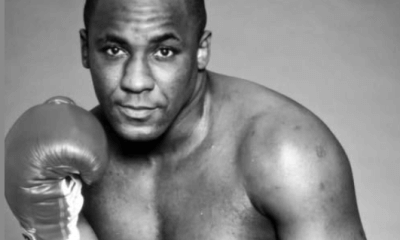Articles of 2006
“Two Ton, One Fight, One Night, Tony Galento v. Joe Louis”
by Robert Mladinich
In his newly published book, “Two Ton, One Fight, One Night, Tony Galento v. Joe Louis” (Steerforth Press), author Joseph Monninger describes the 5’9”, 230-pound “Two Tony” Galento as “beetle-browed, nearly bald, with a head that rode his collarbones like a bowling ball returning on the rails.
“He appeared nearly square, his legs two broomsticks jammed into a vertical hay bale. His thick-lipped mouth, partially open as if to persuade flies to visit, looked more comfortable turned around the boiling stem of a cigar.”
Monninger also recounts a conversation between former heavyweight champion Gene Tunney and New Jersey boxing commissioner Abe Green. Commenting on Galento’s dietary habits, they said something to the effect of, “three chickens, as many vegetables as could feed a family of five, milk, dessert, and occasionally up to 50 glasses of beer.”
Oddly enough, according to Monninger, Galento’s nickname was not derived from his beer-barrel shaped torso. He subsidized his boxing career by delivering ice. One day, when he was late arriving late for a bout, he told his frantic manager that he’d just delivered two tons of ice. In the parlance of the day, Galento was an “ice man.”
The moniker would last until his death, which came in 1979 from complications brought on by diabetes.
In June 1939, Galento, who was coming off of 11 straight knockout victories, challenged Joe Louis for the heavyweight title at Yankee Stadium.
Although most people expected Louis to win, the colorful Galento had the nation’s interest. A native of Newark, New Jersey, he owned a tavern in nearby Orange. But his popularity did not begin and end in his home state.
At a time when boxing was the most popular sport in the United States, Galento, the son of Italian immigrant parents who, when asked how he would fare against Louis, said, “I’ll moida the bum,” certainly had his own identity.
Although short and squat and in no way resembling a world-class athlete, Galento’s pulverizing power had garnered him the nickname “The New Jersey Nightstick.”
Monninger entertainingly chronicles Galento’s career, while also examining the state of the nation in the post-Depression years before World War II.
The social forces that made Galento such a mythological character are recounted with great skill by the extremely talented Monninger, the author of eight novels and two memoirs, and a two-time recipient of fellowships from the National Endowment for the Arts.
Most armchair historians remember Galento for his catchy nickname and his memorable phrase about what he’d do to Louis. They also can’t forget the fact that, even after absorbing a tremendous beating, he knocked the great Louis down in the third round before being stopped in the fourth.
What Monninger brings out so eloquently is the fact that the fight itself has a lot more sociological significance than one might expect.
“The theme played over and over in papers and on radio broadcasts,” writes Monninger. “It was an American theme about overlooked champions, men and women who, under different circumstances, better handling, smarter moves, might have achieved something memorable.
“Coming as it did at the bitter end of the Depression, readers and listeners understood it intuitively,” he continued. “Perhaps it was fantasy, because Tony, like others, had lived his fate and made his own poor calculations. And maybe only his left hand had brought the matter to anyone’s attention, a lucky blow, perhaps, or the diminished greatness of a fighter whose heart surprised all who counted him out beforehand.
“One punch had slipped through the Brown Bomber’s superior artfulness, and Tony Galento followed it into the darkness he nearly brought to his opponent, and became in that instant another near success.”
Galento boxed professionally from 1928-44. Known as an extremely dirty fighter who would thumb, gouge, head-butt and elbow his opponents, he amassed a record of 79-26-5 (56 KOS).
Early in his career, in 1931 in Detroit, Galento beat three inexperienced opponents in one night. Between bouts, he guzzled beer. One of his opponents, Paul Thierman, who went three full rounds with Galento, had also scored a knockout and a decision on the same card.
Galento’s 14th round stoppage of Lou Nova, in the bout immediately after his fight with Louis, is still considered one of the dirtiest fights in history. Galento also lost
Back to back bouts to brothers Max and Buddy Baer at the tail end of his career.
Over the years, Galento’s reputation has softened a bit. In boxing it is easy to cast such characters as unique, lovable rogues. The truth was, his corner man, the inherently decent Ray Arcel, once said, “Nobody really liked him, except maybe the guys who hung out in his saloon. He was a crude guy, to put it mildly, who would resort to all sorts of foul tactics to win a fight.”
Even Louis, who rarely if ever spoke ill of his opponents, would criticize Galento for his insults and race-baiting. Monninger writes that in the weeks leading up to the Louis fight, Galento, while “alone and late at night,” often dialed the champ’s number at his Pompton Lakes, New Jersey, training camp.
“He called Louis every name in the book, questioned his manhood, talked about his race, made sexual references about Marva, Louis’s wife.”
Years later Galento apologized to Louis for those actions and the always gracious Louis accepted it. But, concluded Monninger, “at the time the phone calls and mocking served as bluster to cover Galento’s own insecurity.”
Like so many other fighters of the era, Galento, who once boxed a bear and a kangaroo, began wrestling when his career was over. Besides grappling with humans, he also wrestled an octopus in Seattle.
He ran his tavern for many years, tried stand-up comedy, and appeared in several films, including “Guys and Dolls” and “On the Waterfront.”
As a publicity stunt, he once campaigned for president as a representative of the Prohibition Party. During a parking altercation outside his bar he was hit over the head by a policeman’s nightstick after the cop claimed Galento threw a right hand at him.
Galento said he was being “persecuted for being famous, and that he put Orange on the map.”
On another occasion he was heckling comedian Jackie Gleason during Gleason’s nightclub act. As fat as Gleason was, he could handle himself in a street fight. Mistaking Galento for a blowhard drunk, he asked him to step outside.
Gleason threw a punch, but Galento’s landed first. Even if he’d been able to, Gleason was in no rush to get up.
Monninger doesn’t cast any aspersions on Galento’s character. He writes about Louis, Galento, their battle, and the time in which they lived without rancor and with great honesty.
If one didn’t know any better, they would think that the author actually lived during those times.
Recounting that the newspapers of the day described Galento as “the clown who fought like a hero,” Monninger glowingly, vividly and inspiringly recounts that “a moment, and an era reminds us that sometimes it is through effort, exceeding expectations and beating the odds, that people can most enduringly define themselves.”
For all of two seconds, as Louis lay on the canvas, Galento was, for all intents and purposes, the heavyweight champion of the world. Sadly, he never got the chance to land that second punch.
This wonderful book will exceed any reader’s expectations. Pulling you in from the first page of the preface, it never stops packing the same wallop that would have been contained in a follow-up left hook by Galento.
-

 Featured Articles4 weeks ago
Featured Articles4 weeks agoA Night of Mismatches Turns Topsy-Turvy at Mandalay Bay; Resendiz Shocks Plant
-

 Featured Articles2 weeks ago
Featured Articles2 weeks agoAvila Perspective, Chap. 330: Matchroom in New York plus the Latest on Canelo-Crawford
-

 Featured Articles1 week ago
Featured Articles1 week agoVito Mielnicki Jr Whitewashes Kamil Gardzielik Before the Home Folks in Newark
-

 Featured Articles4 weeks ago
Featured Articles4 weeks agoRemembering the Under-Appreciated “Body Snatcher” Mike McCallum, a Consummate Pro
-

 Featured Articles4 weeks ago
Featured Articles4 weeks agoAvila Perspective, Chap 329: Pacquiao is Back, Fabio in England and More
-

 Featured Articles3 weeks ago
Featured Articles3 weeks agoOpetaia and Nakatani Crush Overmatched Foes, Capping Off a Wild Boxing Weekend
-

 Featured Articles3 weeks ago
Featured Articles3 weeks agoFabio Wardley Comes from Behind to KO Justis Huni
-

 Featured Articles2 weeks ago
Featured Articles2 weeks agoCatching Up with Clay Moyle Who Talks About His Massive Collection of Boxing Books















